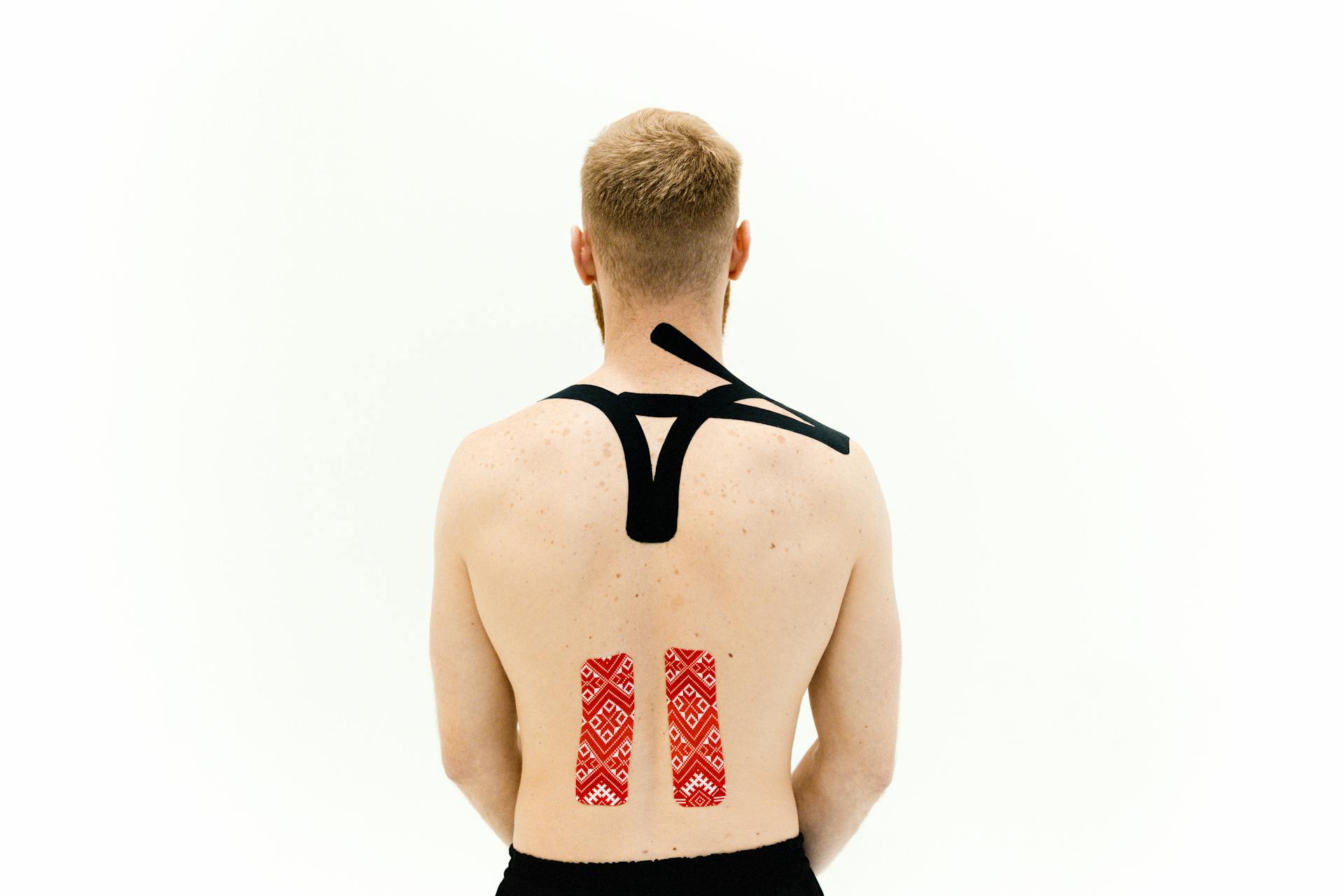
Mini Dachshunds are prone to several health issues due to their unique body shape and breeding history. One of the most common issues is Intervertebral Disc Disease (IVDD), which can cause back problems and paralysis.
As mentioned earlier, obesity is a significant contributor to IVDD, so it's essential to monitor your Mini Dachshund's food intake and ensure they get regular exercise. Regular check-ups with your veterinarian can also help identify potential problems early on.
Mini Dachshunds can be sensitive to anesthesia, so it's crucial to choose a veterinarian who has experience with their breed. They can also be prone to eye problems, such as cataracts and progressive retinal atrophy, which can lead to blindness if left untreated.
Readers also liked: Are Goldendoodles Prone to Cancer
Mini Dachshund Health Issues
Mini Dachshunds are prone to back problems due to their short legs, with approximately 25% suffering from conditions like Intervertebral Disc Disease.
Their fragile backs require immediate veterinary attention if any suspicions of back problems arise.
Worth a look: Back Brace for Dachshunds
Dachshunds are also more likely to experience kneecap issues, such as Patella Luxation, due to their short legs changing the angle of their kneecap.
This can often be treated surgically after a physical examination by a qualified vet.
Hip Dysplasia is another common issue in Dachshunds, caused by a deformity of the hip joint that leads to lameness in the rear legs.
Eye problems are also common, with Dachshunds often suffering from congenital issues such as dry eye, Progressive Retinal Atrophy, and cataracts.
A balanced diet and regular exercise can help prevent obesity, which puts extra pressure on their spine and increases the likelihood of back problems.
Genetics also play a role, with Dachshunds having a predisposition to epilepsy and idiopathic seizures.
Intriguing read: Weiner Dog Legs
Preventing and Managing Health Issues
To protect your mini Dachshund from developing skeletal illnesses, it's essential to avoid rough handling and monitor their weight. Pick up your doggo with care, holding them both under the armpits and at the hips when you carry them. This will help prevent unnecessary stress on their back and legs.
Limiting activities is also crucial, especially climbing up and down stairs and jumping on and off furniture. Consider buying a PawRamp to help them get to their favorite spot on the couch safely.
A well-balanced diet is also vital for your mini Dachshund's health. Feed them only the best dry dog food, and follow the serving recommendations to keep obesity at bay. You can also consider adding dietary supplements, such as Glucosamine, chondroitin, and MSM, to promote joint health.
Here are some essential supplements for your mini Dachshund's back and eye health:
- Glucosamine, chondroitin, and methylsulfonylmethane (MSM) supplements
- Omega-3 fatty acids (fish oil)
- Certain antioxidants and vitamins
Nutrition and Diet
Dachshunds require a well-balanced diet to stay healthy, and feeding them an AAFCO-approved food will provide all the necessary nutrients.
You can also consider adding dietary supplements to support your dog's back and eye health. Glucosamine, chondroitin, and methylsulfonylmethane (MSM) supplements promote joint health.
Omega-3 fatty acids, found in fish oil, have anti-inflammatory properties and keep your Dachshund's skin and coat healthy.
Certain antioxidants and vitamins can reduce stress on the special lens cells in the eye and delay cataract development.
Here are some key supplements to consider:
- Glucosamine, chondroitin, and MSM for joint health
- Omega-3 fatty acids (fish oil) for healthy skin and coat
- Certain antioxidants and vitamins for eye health
Pet Care and Hygiene
Dachshunds don't need to be bathed often, but their bellies may need more frequent brushing because they can easily pick up debris from the ground.
Bathing your Dachshund once every few months is usually okay, but it's best to ask your vet for the best guidance.
Ear infections are common in Dachshunds because of their floppy ears, which can trap moisture and lead to bacterial or yeast overpopulation.
Checking your Dachshund's ears for excessive wax once a month can help prevent ear infections. You can look at their ears when you're bathing them, brushing them, or trimming their nails.
Broaden your view: Bichon Frise Ears
Preventing Illnesses
Preventing illnesses in your Dachshund is crucial to ensure they live a happy and healthy life. To start, it's essential to avoid rough handling, as this can cause unnecessary stress on their back and legs. Pick up your dog with care, holding them under the armpits and at the hips when you carry them.
Monitoring your Dachshund's weight is also vital. Feed them high-quality dry dog food and follow the serving recommendations to prevent obesity. This will help minimize the risk of back injuries and other health issues.
Limiting their activities is another crucial step. Avoid letting them climb up and down stairs or jump on and off furniture, as this can exert unnecessary stress on their back. Consider investing in a PawRamp to help them get to their favorite spot safely.
Dachshunds love to burrow under blankets, so be mindful of where you sit to avoid accidentally sitting on them. Brushing their teeth every other day is also important for maintaining their dental hygiene.
Here are some essential tips to prevent illnesses in your Dachshund:
Specific Health Issues
Dachshunds are prone to certain health issues due to their distinctive body build, which can lead to premature degeneration of the spinal discs and Intervertebral Disk Disease (IVDD).
IVDD is a hereditary condition affecting one in every four Dachshunds, and can result in paralysis if left untreated. It's characterized by symptoms such as neck, limb, or back stiffness, dragging of the hind legs, and obvious pain during running or jumping.
Here are some common symptoms of IVDD:
- Neck, limb, or back stiffness
- Dragging of the hind legs
- Obvious pain during running or jumping
- Heightened sensitivity to movement or touch
- Decreased activity
Serious Concerns
As a Dachshund owner, it's essential to be aware of the serious health concerns that can affect your furry friend. Intervertebral Disc Disease (IVDD) is a common issue that can cause significant neurological problems, including weakness in the limbs and even paralysis.
IVDD occurs when the shock-absorbing discs between the bones of the spine degenerate early on in life. Depending on the severity, your veterinary neurologist may recommend either medical management or surgery.
Bloat and Gastric Dilatation-Volvulus (GDV) is another life-threatening condition that can affect Dachshunds. Symptoms include a swollen belly, pacing, drooling, and retching.
Eye problems such as cataracts, glaucoma, and progressive retinal atrophy (PRA) are also common in Dachshunds. These conditions can cause blindness, and PRA is unfortunately not treatable.
Consider reading: Signs of Ivdd in Dachshunds

Cerebellar abiotrophy, or degeneration, is a neurological problem that affects the balance system, causing uncoordinated movements and tremors. Physical therapy can provide some relief, but there is no definitive treatment.
Degenerative mitral valve disease (DMVD) is a heart condition that affects small and miniature breeds, including Dachshunds. It's usually diagnosed in dogs over eight years old, and your vet can detect it with a distinctive heart murmur.
Here are some common symptoms of serious health issues in Dachshunds:
- Swollen belly or pot-bellied appearance
- Pacing or restlessness
- Drooling or retching
- Red, swollen, or irritated eyes
- Bumping into things or showing anxiety
- Fine head tremors or uncoordinated movements
Neurological Issues
Dachshunds are prone to several neurological issues, including Intervertebral Disc Disease (IVDD), which affects up to 25% of the breed.
IVDD occurs when the shock-absorbing discs between the bones of the spine degenerate early on in life, causing significant neurological problems in dachshunds. The resulting bulge pinches the spinal cord, leading to weakness or paralysis in the affected limbs.
Symptoms of IVDD include trouble walking, limping, holding the head or neck down, dragging paws, and scuffed toenails. If you notice any of these symptoms, bring your dachshund to the vet immediately.
Explore further: Ivdd vs Degenerative Myelopathy
Treatment for IVDD may involve anti-inflammatory and pain medications, muscle relaxants, and strict cage rest. In severe cases, surgical correction may be necessary to help dogs regain use of their legs and other functions affected by a slipped disc.
Myasthenia Gravis is another potential dachshund health issue, characterized by a generalized weakness in patients that is made worse with exercise. Dachshunds tend to have the genetic form of the disease, which usually makes its appearance early on in life, around eight weeks.
Narcolepsy is a rare but interesting disease that can affect dachshunds, causing sudden catatonic-like states or attacks of sleepiness. Treatment for narcolepsy involves finding the best combination of antidepressant and stimulant medications for your individual doxie.
Cerebellar Abiotrophy, or degeneration, is a possible dachshund health issue that occurs when the cells that help with the body's balance system die off earlier than they should in life. Unfortunately, this disease has no definitive treatment and will progressively worsen over time.
Here are some common neurological issues in dachshunds, along with their symptoms and potential treatments:
Skeletal Problems
Dachshunds are prone to several skeletal problems due to their unique body build. Their long, narrow bodies and short legs can put a lot of strain on their spines and joints.
Intervertebral Disc Disease (IVDD) is one of the most common skeletal issues affecting Dachshunds. It occurs when the shock-absorbing discs between the bones of the spine degenerate early on in life, causing neurological problems.
IVDD can affect up to 25% of Dachshunds, and it's essential to recognize the symptoms, which include neck, limb, or back stiffness, dragging of the hind legs, and obvious pain during running or jumping.
Dachshunds are also prone to hip and elbow dysplasia, which can lead to lameness and joint pain. Hip dysplasia is more common, but elbow dysplasia can affect the forelimbs.
Legg-Calve-Perthes disease is another skeletal issue that can affect Dachshunds, particularly those between five and eight months of age. It causes the femoral head to degenerate, leading to arthritis and mobility problems.
Here are the common skeletal problems affecting Dachshunds:
- Intervertebral Disc Disease (IVDD)
- Hip dysplasia
- Elbow dysplasia
- Legg-Calve-Perthes disease
Early detection and treatment are crucial in managing these skeletal issues. Regular check-ups with your veterinarian can help identify any potential problems before they become severe.
Luxating Patella
Luxating Patella is a common issue in small dogs, including Dachshunds, where the kneecap slips out of its normal position.
This condition often occurs simultaneously in both hind legs, which can be a challenge to manage. You may notice your Dachshund limping on their hind legs or see a "skip" or "bunny hop" to their gait when they walk.
Some dogs don't require any treatment, but others may need anti-inflammatory and pain medications or even corrective surgery. Giving your dog joint protection supplements may help prevent secondary issues related to luxating patellas.
Ear Problems
Ear infections are a common issue in Dachshund dogs due to their floppy ears, which can trap moisture and lead to bacterial and yeast overpopulation.
Regular ear checks are crucial to prevent infections. Check your dog's ears once a month, ideally when bathing, brushing, or trimming their nails.
Moisture buildup is a significant contributor to ear infections. Trapped moisture creates an ideal environment for bacteria and yeast to grow.
Cleaning your dog's ears properly is essential. Ask your vet for guidance on ear cleaning products and techniques to use.
Check this out: Pit Bulls Ears
Teeth Problems
Dachshunds are prone to rapid tooth decay and periodontal diseases, particularly Miniature Dachshunds.
Their dental issues are often the result of chondrodysplasia, which causes their jaws to be too small to fit all their teeth comfortably.
This leads to teeth crowding, making it easy for bits of food to get stuck in between teeth.
Doxies frequently develop plaque and tartar buildup, which can lead to serious dental problems.
As a result, they're prone to early tooth loss, which can be painful and costly to treat.
Explore further: Dental Health Diets for Dogs
Color Dilution Alopecia
Color Dilution Alopecia is a condition that affects dilute Dachshunds, such as Blue or Isabella Dachshunds. It's a genetic condition that typically appears after six months of age.
The first signs of CDA are hair thinning, patchy or complete hair loss, itchy skin, and flaky skin. This can be a concern for any dog owner, as it affects their physical appearance.
If left untreated, CDA can lead to bacterial infections, which can cause the formation of fistulas, lumps, bumps, and open wounds on your dog's skin. This is because their skin is exposed and cracked.
Dilute Dachshunds are also at risk of getting sunburned quickly, which increases their risk of skin cancer.
To manage CDA, it's essential to take care of your dog's skin. This includes keeping their skin moisturized, protecting them from the sun, and monitoring for any signs of infection.
Curious to learn more? Check out: Do Dachshunds Have Fur or Hair
Health Conditions in Mini Dachshunds
Mini Dachshunds are prone to back problems due to their short legs, with approximately 25% suffering from Intervertebral Disc Disease (IVDD).
Their fragile backs make them vulnerable to bursting with any jarring movement, so suspicions of back problems require immediate veterinary attention.
Dachshunds can also suffer from Patella Luxation, where the kneecap pops out of its groove, often due to their short legs changing the angle of their kneecap.
Hip Dysplasia is another issue they're susceptible to, caused by a deformity of the hip joint that can lead to lameness in the rear legs.
Eye problems, such as dry eye, Progressive Retinal Atrophy, and cataracts, are also common in Dachshunds.
Obesity is a significant concern for mini Dachshunds, as it can put extra pressure on their spine and increase the likelihood of back problems.
Seizures are also a genetic predisposition for Dachshunds, with many suffering from idiopathic epilepsy.
For another approach, see: American Bully Back Leg Problems
Dental Issues
Dental disease is a common health issue in mini Dachshunds, and it's essential to address it promptly. Small dogs like Dachshunds are more prone to periodontal disease.
Brushing your mini Dachshund's teeth daily is the best way to prevent dental disease. Your veterinarian can recommend the best dog toothpastes and toothbrushes, along with dental chews.
Regular professional cleanings are also crucial to prevent dental disease. Pet parents must have their mini Dachshund's teeth professionally cleaned, usually once a year.
Worth a look: How to Prevent Diabetes in Dogs
Lafora
Lafora is a genetic health issue that affects miniature wire-haired dachshunds, and it tends to occur later in life.
The hallmark of this disease is myoclonic epilepsy, which is characterized by brief, shock-like jerking spasms of a muscle or muscle group.
Diagnosis of Lafora can be difficult, and unfortunately, there is no definitive cure available.
The prognosis for Lafora is poor, which can be devastating for dog owners who are dealing with this disease.
Pet Insurance and Care
Pet insurance can be a lifesaver for Miniature Dachshund owners, as it can help cover unexpected veterinary bills. Four out of five pet parents can't afford a $5,000 bill out-of-pocket, so having insurance can be a financial safety net.
Having pet insurance can ensure that your Miniature Dachshund gets the care they need at any stage of their life, without breaking the bank. It's a tool to hedge financial risk and dog health costs, reimbursing you 70% to 90% of the vet bill, depending on your plan.
To find the best pet insurance policy for your Miniature Dachshund, look beyond the initial cost and consider the long-term value of each policy. Different providers have different rate increases, so a cheaper policy today might not be the best choice in the long run.
Here are some key things to consider when shopping for pet insurance:
- Coverage Score: Compare the kinds of coverage offered by different insurance companies.
- Lifetime Value Score: Consider how much each policy is expected to cost over your dog's lifetime.
Is Pet Insurance Worth It?
Pet insurance is a great tool to hedge financial risk and dog health costs. It's like having renters insurance, something you have but hope not to use, but if an unexpected accident or illness does strike, you'll be reimbursed 70% to 90% of the vet bill.
Pure breeds like the Miniature Dachshund are more likely to suffer from genetic health issues. This means they may need costly medical treatment.
If you can't afford an unexpected $5,000 veterinary bill out-of-pocket, pet insurance is a lifesaver. Four out of five pet parents can't, so it's worth considering.
Having pet insurance coverage will ensure your furry friend gets the care they need at any stage of their life.
Best Pet Insurance Options
Getting the right pet insurance for your Miniature Dachshund can be overwhelming, but it's a crucial step in ensuring their health and well-being.
Pricing for pet insurance varies depending on factors like your dog's breed, age, location, and more. For example, a 6-month-old Miniature Dachshund in New York City could cost between $48 to $775 per month, while one in Thomasville, AL could cost between $26 to $415 per month.
It's essential to consider not just the upfront cost, but also how much your premium may increase over time. Different policies will have different rates, so it's crucial to understand the fine print.
Consider reading: Dog Blood Work Cost near Me
Pawlicy Advisor is a great tool to help you compare pet insurance options and find the best fit for your Miniature Dachshund. They offer a personalized "Coverage Score" and "Lifetime Value Score" for hundreds of policy variations from top pet health insurance companies.
To give you an idea of what to expect, here are some of the best pet insurance options for your Miniature Dachshund:
Remember, the right pet insurance policy will depend on your individual circumstances and needs. Be sure to research and compare different options to find the best fit for you and your Miniature Dachshund.
Frequently Asked Questions
What are the cons of a miniature dachshund?
Miniature Dachshunds may be prone to back issues due to their long spines and can be a high-maintenance breed that requires close attention. They also have a tendency to bark frequently, making them a consideration for owners who value a quieter home
What is the life expectancy of a miniature dachshund?
Miniature dachshunds typically live for 12 to 16 years, making them a long-term companion for many families. With proper care and socialization, they can thrive and bring joy to their owners for many years.
Are mini Dachshunds healthier?
Miniature Dachshunds are generally healthy, but like all breeds, they can be prone to certain health issues, particularly back problems due to their short legs. Regular care and monitoring can help minimize the risk of these conditions.
Sources
- https://www.petmd.com/dog/breeds/dachshund
- https://sevneurology.com/blog/dachshund-health-issues-5-neurological-problems
- https://www.alphapaw.com/dog-breeds/dachshund-health-issues/
- https://www.pawlicy.com/dog-insurance/miniature-dachshund-pet-insurance/
- https://www.greencrossvets.com.au/pet-library/dogs/breed-guides/dachshund-owners-guide/
Featured Images: pexels.com


